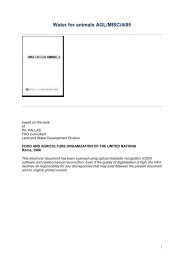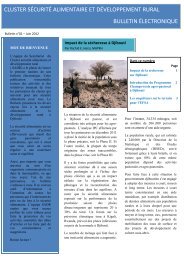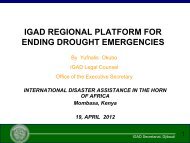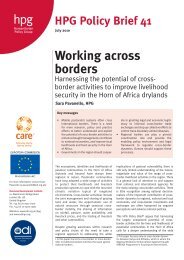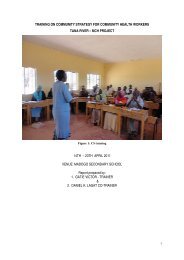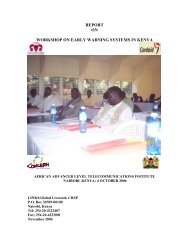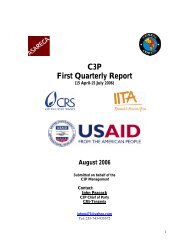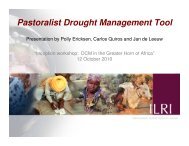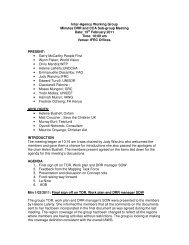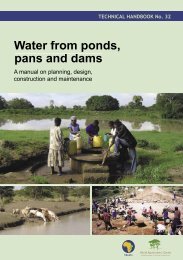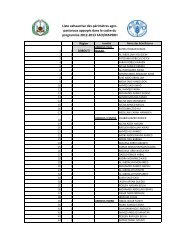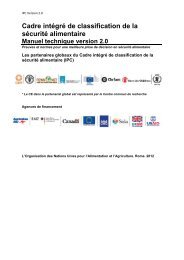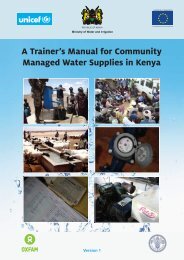Synthesis of Existing Knowledge and Experience on the Provision of ...
Synthesis of Existing Knowledge and Experience on the Provision of ...
Synthesis of Existing Knowledge and Experience on the Provision of ...
Create successful ePaper yourself
Turn your PDF publications into a flip-book with our unique Google optimized e-Paper software.
CARE Internati<strong>on</strong>al, under <strong>the</strong> GWI, has also developed guidelines to ensure c<strong>on</strong>flict sensitiveplanning. This is a how-to guide for practiti<strong>on</strong>ers to recognize <str<strong>on</strong>g>and</str<strong>on</strong>g> avoid water-triggered c<strong>on</strong>flict(Demeke, 2008).An Integrated Water Resource Management (IWRM) strategy has been developed under <strong>the</strong>initiative, which highlights key areas <strong>on</strong> which to focus. Key points <str<strong>on</strong>g>and</str<strong>on</strong>g> <strong>the</strong> extent to which <strong>the</strong>strategy has influenced practice are highlighted in <strong>the</strong> table below:Table 5: CARE’s IWRM Strategy <str<strong>on</strong>g>and</str<strong>on</strong>g> degree to which <strong>the</strong> strategy has influenced practice.CARE’s Integrated Water ResourceManagement Strategy 48• Water interventi<strong>on</strong>s must bec<strong>on</strong>textualized within <strong>the</strong>broader l<str<strong>on</strong>g>and</str<strong>on</strong>g>scape so as to leadto sustainable pasture <str<strong>on</strong>g>and</str<strong>on</strong>g> l<str<strong>on</strong>g>and</str<strong>on</strong>g>use. A z<strong>on</strong>al or higher levelcustomary body should beidentified which can advise <strong>on</strong>water <str<strong>on</strong>g>and</str<strong>on</strong>g> pasture interventi<strong>on</strong>s.In <strong>the</strong> absence <str<strong>on</strong>g>of</str<strong>on</strong>g> such a body, orwhere capacity still needs to bestreng<strong>the</strong>ned, practiti<strong>on</strong>ersmust underst<str<strong>on</strong>g>and</str<strong>on</strong>g> local levelcustomary ways <str<strong>on</strong>g>of</str<strong>on</strong>g> doing things,including how rangel<str<strong>on</strong>g>and</str<strong>on</strong>g>s aretraditi<strong>on</strong>ally managed, beforeany interventi<strong>on</strong>s take place.• The right scale <str<strong>on</strong>g>of</str<strong>on</strong>g> interventi<strong>on</strong>needs to be identified (clan area,woreda unit, kebele unit, z<strong>on</strong>alunit, etc.) <str<strong>on</strong>g>and</str<strong>on</strong>g> who should beinvolved in planning, negotiating<str<strong>on</strong>g>and</str<strong>on</strong>g> managing resources at thatscale.• The initiative should workthrough a local woreda levelmulti-stakeholder forum. Thisforum, which should involvecommunity, local government<str<strong>on</strong>g>and</str<strong>on</strong>g> NGOs, needs to beestablished <str<strong>on</strong>g>and</str<strong>on</strong>g> should besupported by CARE. The forumshould assume resp<strong>on</strong>sibility forimplementati<strong>on</strong>, m<strong>on</strong>itoring <str<strong>on</strong>g>and</str<strong>on</strong>g>follow up <str<strong>on</strong>g>of</str<strong>on</strong>g> interventi<strong>on</strong>s under<strong>the</strong> initiative. GIS mapping <str<strong>on</strong>g>of</str<strong>on</strong>g>water points <str<strong>on</strong>g>and</str<strong>on</strong>g> local physicalfeatures should be supported by<strong>the</strong> forum to aid in <strong>the</strong> planningprocess, <str<strong>on</strong>g>and</str<strong>on</strong>g> findings shared with<strong>the</strong> customary body identifiedabove.Some examples <str<strong>on</strong>g>of</str<strong>on</strong>g> <strong>the</strong> extent to which <strong>the</strong> strategy hasinfluenced practice• CARE facilitates <strong>the</strong> identificati<strong>on</strong> <str<strong>on</strong>g>and</str<strong>on</strong>g> selecti<strong>on</strong> <str<strong>on</strong>g>of</str<strong>on</strong>g> sites forwater development as well as target beneficiaries throughparticipatory planning, which involves representatives <str<strong>on</strong>g>and</str<strong>on</strong>g>leaders <str<strong>on</strong>g>of</str<strong>on</strong>g> customary instituti<strong>on</strong>s, local government sector<str<strong>on</strong>g>of</str<strong>on</strong>g>fices, <str<strong>on</strong>g>and</str<strong>on</strong>g> women from <strong>the</strong> community.• CARE <str<strong>on</strong>g>and</str<strong>on</strong>g> program partners have established <str<strong>on</strong>g>and</str<strong>on</strong>g> aresupporting <strong>the</strong> Woreda development coordinati<strong>on</strong>committee, a community based participatory m<strong>on</strong>itoringgroup, <str<strong>on</strong>g>and</str<strong>on</strong>g> a Woreda learning alliance group. The Woredadevelopment coordinati<strong>on</strong> committee was establishedto ensure <strong>the</strong> active involvement <str<strong>on</strong>g>of</str<strong>on</strong>g> communities <str<strong>on</strong>g>and</str<strong>on</strong>g> localgovernment in planning <str<strong>on</strong>g>and</str<strong>on</strong>g> m<strong>on</strong>itoring <str<strong>on</strong>g>of</str<strong>on</strong>g> interventi<strong>on</strong>s, <str<strong>on</strong>g>and</str<strong>on</strong>g>includes community representatives (includingrepresentatives <str<strong>on</strong>g>of</str<strong>on</strong>g> customary instituti<strong>on</strong>s <str<strong>on</strong>g>and</str<strong>on</strong>g> women),representatives from local government sector <str<strong>on</strong>g>of</str<strong>on</strong>g>fices <str<strong>on</strong>g>and</str<strong>on</strong>g>NGOs working locally. To date, <strong>the</strong> committee has activelyparticipated in <str<strong>on</strong>g>and</str<strong>on</strong>g> facilitated participatory m<strong>on</strong>itoringsessi<strong>on</strong>s during <strong>the</strong> pilot phase <str<strong>on</strong>g>of</str<strong>on</strong>g> <strong>the</strong> GWI to reviewimplementati<strong>on</strong> progress <str<strong>on</strong>g>of</str<strong>on</strong>g> <strong>the</strong> pilot. This committee hasalso facilitated <strong>the</strong> identificati<strong>on</strong> <str<strong>on</strong>g>and</str<strong>on</strong>g> prioritizati<strong>on</strong> <str<strong>on</strong>g>of</str<strong>on</strong>g>interventi<strong>on</strong>s <str<strong>on</strong>g>and</str<strong>on</strong>g> target groups for <strong>the</strong> l<strong>on</strong>ger term porti<strong>on</strong><str<strong>on</strong>g>of</str<strong>on</strong>g> <strong>the</strong> GWI initiative. The community basedparticipatory m<strong>on</strong>itoring group was established toensure representative participati<strong>on</strong> <str<strong>on</strong>g>of</str<strong>on</strong>g> all social groups withina community. This group is expected to lead in planning <str<strong>on</strong>g>and</str<strong>on</strong>g>m<strong>on</strong>itoring, <str<strong>on</strong>g>and</str<strong>on</strong>g> comprises local leaders, leaders <str<strong>on</strong>g>of</str<strong>on</strong>g>customary pastoral instituti<strong>on</strong>s, elders <str<strong>on</strong>g>and</str<strong>on</strong>g> women. Thisgroup has helped identify <str<strong>on</strong>g>and</str<strong>on</strong>g> select interventi<strong>on</strong> sites <str<strong>on</strong>g>and</str<strong>on</strong>g>target groups for <strong>the</strong> l<strong>on</strong>ger term porti<strong>on</strong> <str<strong>on</strong>g>of</str<strong>on</strong>g> <strong>the</strong> GWI, incollaborati<strong>on</strong> with local government sector representatives.A Woreda learning alliance was established to promote<strong>the</strong> sharing <str<strong>on</strong>g>of</str<strong>on</strong>g> experience <str<strong>on</strong>g>and</str<strong>on</strong>g> best practice am<strong>on</strong>g projectpartners. This, in turn, is meant to promote a harm<strong>on</strong>izedapproach to development by <strong>the</strong> different actors. EngagingNGOs, community groups, <str<strong>on</strong>g>and</str<strong>on</strong>g> local government, CARE hascoordinated <str<strong>on</strong>g>and</str<strong>on</strong>g> facilitated three woreda learning alliancefora aiming to review <strong>the</strong> experiences <str<strong>on</strong>g>of</str<strong>on</strong>g> stakeholders inplanning, managing <str<strong>on</strong>g>and</str<strong>on</strong>g> m<strong>on</strong>itoring implementati<strong>on</strong> relevantto <strong>the</strong> IWRM strategy <str<strong>on</strong>g>and</str<strong>on</strong>g> <strong>the</strong> WASH program. Through<strong>the</strong>se fora, partners were able to systematize <str<strong>on</strong>g>and</str<strong>on</strong>g> harm<strong>on</strong>izeprogram implementati<strong>on</strong> approaches <str<strong>on</strong>g>and</str<strong>on</strong>g> have identifiedremaining gaps to be addressed, including <strong>the</strong> need for wider48 Adapted from Pankhurst (2009)65



